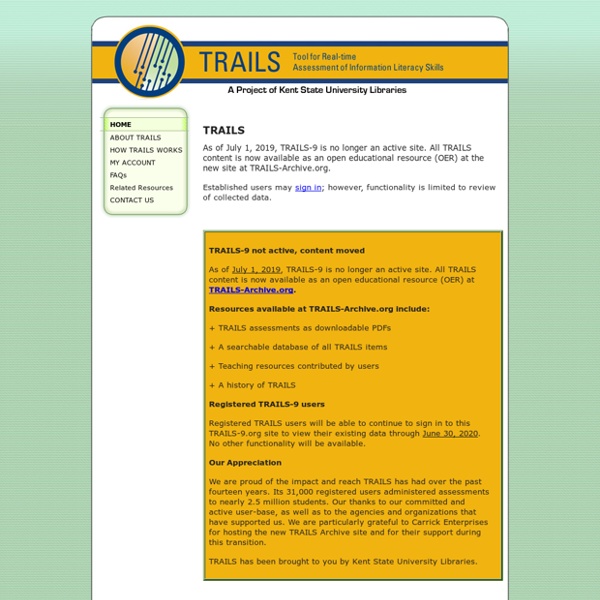



Watch LION: Library Information literacy Online Network Episodes About this original series Welcome to LION TV, an Online Network devoted to helping you learn all about the world of Information. Whether you are wanting to learn how to do Research, use Google more effectively, understand what is an Authoritative web site, or learn about a myriad of issues related to Information; this ever growing network will assist you with your information needs. Content at this site comes from the ANimated Tutorial Sharing Project (see and is produced by professional librarians who work together across institutions to develop programs.
Assessing Change In High School Student Information Literacy Using The Tool For Real-Time Assessment Of Information Literacy Skills Assessing Change In High School Student Information Literacy Using The Tool For Real-Time Assessment Of Information Literacy Skills Cindy L. Kovalik, Susan D. APA Formatting and Style Guide This page is brought to you by the OWL at Purdue University. When printing this page, you must include the entire legal notice. Copyright ©1995-2018 by The Writing Lab & The OWL at Purdue and Purdue University. All rights reserved. This material may not be published, reproduced, broadcast, rewritten, or redistributed without permission. Use of this site constitutes acceptance of our terms and conditions of fair use.
GID – Guided Inquiry Design The icons represent the nuances of each phase. Open represented as an open circle. In GId we open to a concept to start with wonder and curiosity. Immerse looks like ripples in a pool of water. Time spent in this phase ripples into the success of later phases of inquiry. AASL Standards for the 21st-Century Learner Skip to main content ALA User Menu Search form A Division of the American Library Association Embracing Inquiry-Based Instruction Recent education reforms call for a shift in pedagogy to provide students with the skills necessary to be competitive in a global society. One such shift, inquiry-based instruction, is supported by evidence as a successful approach to fulfill the goals and processes of the Next Generation Science Standards (NGSS). Inquiry-based instruction is a student-centered approach where the instructor guides the students through questions posed, methods designed, and data interpreted by the students. Through inquiry, students actively discover information to support their investigations.
Teaching Information Literacy: Tips and Resources 7/1/2003 By: Leonarda Brush What is Information Literacy? The Final Report of the American Library Association Presidential Committee on Information Literacy states, "Information literate people know how to find, evaluate, and use information effectively to solve a particular problem or make a decision — whether the information they select comes from a computer, a book, a government agency, a film, or any number of other possible resources." This seems easy enough to teach on the surface, but when you take into consideration what students do with the information they gather, many factors enter into the learning equation. Instead of wading through hundreds of potential hits, students need to learn:
Inquiry-Based Tasks in Social Studies Many schools, both nationally and internationally, are adopting the College, Career, and Civic Life (C3) Framework for Social Studies State Standards. Some states, districts, and schools adopt the full framework and standards, and others adopt the general framework, but modify or create their own grade-level standards. An important element of the framework either way is something called the Inquiry Arc. The Inquiry Arc comprises four dimensions: “one focused on questioning and inquiry; another on disciplinary knowledge and concepts relating to civics, economics, geography, and history; another on evaluating and using evidence; and a final one on communicating and taking action.” The basic idea is that students ask or are given compelling questions and then investigate those questions, evaluate and find evidence to answer them, and communicate their answers. For example, middle school students might be given the question “Can disease change the world?”
Information Literacy Training for All - The Outliers FEATURE Information Literacy Training for All The Outliers by Lark Birdsong, Birdsong Research The Information Literacy Initiative at the University of Washington Information School is a funded, active organization that began in 2007 after the successful training of a group of youth labeled “at-risk.” In the course of thinking about providing this kind of training, I came across bq’s editorial in the September 2008 issue of Searcher magazine in which she discusses the concept of “outliers.” At that time I had just started another information literacy class for women without homes at The Gathering Place, a day shelter for homeless women in Denver, Colo.